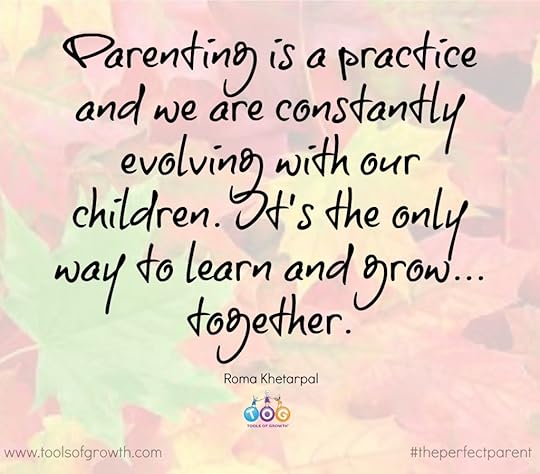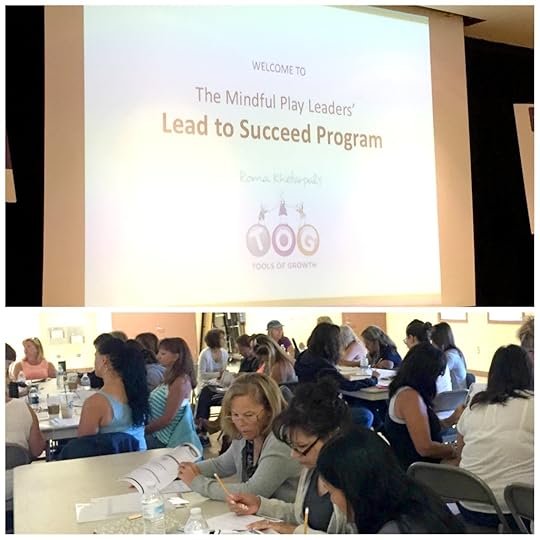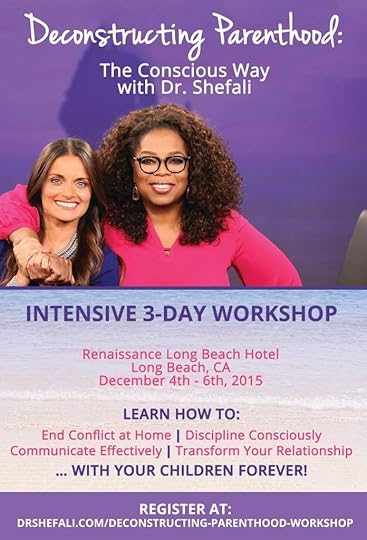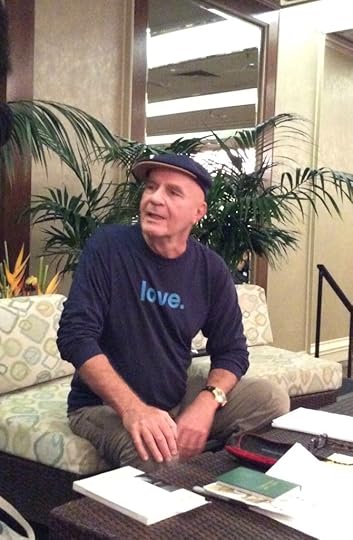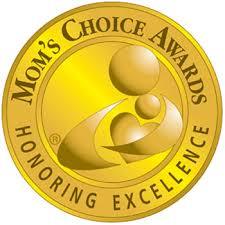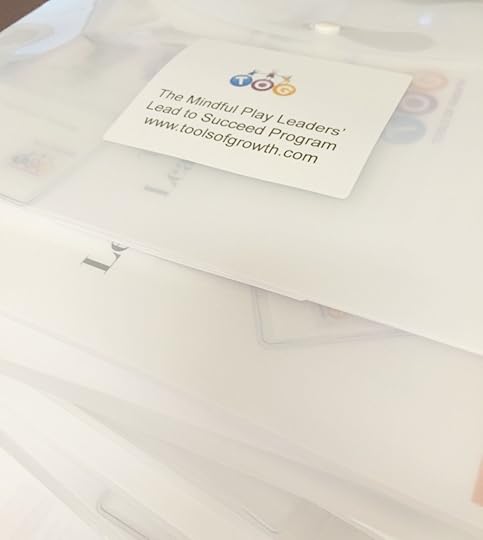Roma Khetarpal's Blog, page 23
October 19, 2015
Reversing Roles with Adult Children
We guide, we share, we teach our kids from the moment they come into the world. We are the parents, and it’s up to us to set the example. When our children make poor choices and say mean things, we correct them and show them the “right” way. There are years and years of us making a difference in their lives, so they will grow up knowing right from wrong.
Once we have children, we generally put our own inner child on the back burner. But as my children have become young adults, I have noticed glimpses of that inner child wanting to come out, join in, and play again.
I had one such childlike moment this weekend, with my daughter, Nitasha, who is now in graduate school in Boston. She had left me a message on Thursday evening, but somehow, with my busy schedule, I didn’t see it until late that night. Considering the time difference, I decided to call her the next day. Come Friday morning, when I dialed her number, our conversation went something like this:
Nitasha: Hellooooo, Mama.
Me: Whaaaaaaaaat up, Tash?
Nitasha: Good morning, Mama!
Me: What up, child?
Nitasha: Good morning and happy Friday, Mama.
Me: So whaz shakin,’ bacon?
Nitasha: Well, my wise mama once told me that a polite, cheerful, and happy morning greeting sets the tone for the day for the sender and the receiver. She also said using slang and improper English is detrimental academically and socially. And, yes, she always reminded us that bad colloquial habits are hard to break. Wondering where that mama is now!
Of course, we both broke out into a huge belly laugh!
Nitasha was right. There comes a point in the parent-child relationship where we find ourselves on the receiving end of our own words reflected back on us. Suddenly, our kids turn on us, and we hear, “Mom, don’t you think you are too old for that?” or “You never let us say that when we were kids.”
On the one hand, it’s great that they listened to our advice. On the other, maybe we’ve done all the parenting we need to, and it’s now okay to feel comfortable enough with our kids to just let loose. Of course, we all know that once a parent, always a parent. But as our kids become adults, we can find ourselves on a more even playing field. One where we’re comfortable letting our guard down.
Maybe we start singing the latest song a little too loudly in the car, or maybe the latest slang starts to come out of our mouths when we speak to our kids.
Maybe we’ve been doing this parenting thing for so long that we just want to let our own inner child out again, or perhaps we are confident enough that our children have become responsible adults who know how to conduct themselves socially. Or maybe—just maybe—we are getting older, and subconsciously we are trying to go back in time and capture moments that make us feel young and “with it.”
Having just turned fifty, I can’t help but reflect on the words of Victor Hugo: Forty is the old age of youth; fifty the youth of old age.
Perhaps that’s what is. Here I am…in my youth again. A youthful parent with adult children, entering a whole new phase of our beautiful relationship, excited to see what the future holds as we mirror each other into the years ahead.
The post Reversing Roles with Adult Children appeared first on Tools of Growth.
October 12, 2015
Words of Enfearment
Discussion with my son, ten years old at the time, on our ride home from school:
“Mom, can I play with my new NBA Hangtime game (Nintendo 64)?”
“ONLY IF you finish your homework, ” I replied robotically.
“Mom, why do you always have to say ‘ONLY IF.’ It sounds like I’ll be punished if I don’t. I hate being punished. Ms. A. uses “IF” all the time and we don’t like it… ‘IF you don’t sit quietly when the new parents come for a tour, you will end up in my office. IF you don’t turn in your science fair topics by tomorrow, you will be not be allowed to attend the fair. IF this, IF that…’” he imitated her.
“Hmm….” is all I could say! I surely didn’t want to sound like Ms. A.!
“What would you like me to say instead?” I asked him instinctively.
I don’t think he expected me to ask him that question. Nonetheless, his quick response astounded me.
“How about WHEN?” he suggested.
“Okay. Let’s try it. When you finish your homework, you can play your new Nintendo game.”
“Thank you. I like that,” he said. And added, “I love you, Mom.”
I definitely would not have wanted my mom to sound like Ms A. either! Later that month, I attended a parenting talk at school that I had signed up for and in relating the experience to the therapist, she informed me that in her world it was called “conditioned parenting.” She also added that it instills FEAR in children.
Wow! My ten year old knew that… naturally.
I went home and told my kids to let me know if there were any words that I used that didn’t “feel” right to them and together we could come up with replacement words. They loved it, it made my life easier AND it was free child development tips from the children themselves! How much easier could parenting get! Did I feel bad about all the “IFs” I’d used thus far? No! Because I know that parenting is a practice and we are constantly evolving with our children. It’s the only way to learn and grow… together.
So, parents:
1. Sit down with your kids and ask them if there are any words that you use that make them afraid or that they simply don’t feel right about and see what they come up with! As long as you’re open minded, you will save yourself some serious anguish.
2. Don’t be too hard on yourself if there are other Words of Enfearment that they bring up. Guilt will only hold you back. Be proud of yourself for being open minded to change and growth. It will benefit you, your child, your family communication habits AND your relationship with your children. It’s a win-win change… I guarantee it!
The post Words of Enfearment appeared first on Tools of Growth.
October 6, 2015
Mindful Play Leaders’ Lead to Succeed Program
When we speak of education, we often discuss curriculum, tests, homework, and how teachers present educational material to students. We focus on technology in the classroom, grades on a report card, and whether one school is providing the same opportunities as the next school. We want to know how many hours of instruction students get, what art projects they are doing, and how many of their hours are filled with STEM-based activities. But we seem to have completely lost sight of one of the most important aspects of being a child—playtime.
In-classroom instruction is important, but equally important is what happens outside of the classroom environment: on the playground. Free time for play is just as much a learning experience as a formal lesson, maybe more so. This unstructured time is critical to a child’s development and gives kids a chance to learn how to resolve conflicts, how to manage emotions, how to build communication skills, and how to use their imaginations. While the teachers’ realm is inside the classroom, it’s the campus supervisors (otherwise known as “yard duties”) who are responsible for the students while they are outdoors. With no prerequisites for the job, campus supervisors receive only safety training (provided by the insurance company). They get no training, instructions, or tools to manage children or, more importantly, to manage children’s emotions. Until now.
Seeing a need for this, the Saugus Union School District, in Santa Clarita, California, is piloting a unique program called The Mindful Play Leaders’ Lead to Succeed Program, specially designed for the campus supervisors at all 15 of their school sites. The creator of this grass-roots 4-part workshop is Roma Khetarpal, founder of Tools of Growth and author of the award-winning book, The “Perfect” Parent: 5 Tools for Using Your Inner Perfection to Connect With Your Kids.
Roma has taken the tools she describes in her book and customized them to the schoolyard. Being mindful, she points out, isn’t just for parents. It’s also critical for campus supervisors, who are the ones teaching children about emotional management, dealing with bullies, how to share, conflicts with friends, taking turns, and so many other aspects of a child’s playtime.
Roma has empowered the campus supervisors, emphasizing the importance of their role and giving them the tools to effectively talk to the kids and to help children learn to:
Be emotionally intelligent
Build character
Develop social skills
Make good decisions
Amazingly the average time on the job for a campus supervisor is 9½ years. That’s a long time to be at a job with no training or recognition. Says Roma, “Everyone has a desire to grow. It’s critical for happiness in your job.” And, she adds, “Even though these tools are designed to be used with children during play, these Tools of Growth are applicable to every aspect of our lives: at home, in our job, in our friendships, and especially when we relate to children.”
Here’s what some campus supervisors have said:
“I relate better to the kids.”
“The communication is better.”
“Thank you for telling us how valuable we are.”
“The Toolbox helped me with the everyday things too.”
This program is designed for any school—at a district workshop or on an individual site basis.
To learn more about this Mindful Play Leader, Lead to Succeed program, please contact us at Roma@ToolsofGrowth.com or Carolyn@toolsofgrowth.com.
The post Mindful Play Leaders’ Lead to Succeed Program appeared first on Tools of Growth.
September 28, 2015
Imagination Running Wild
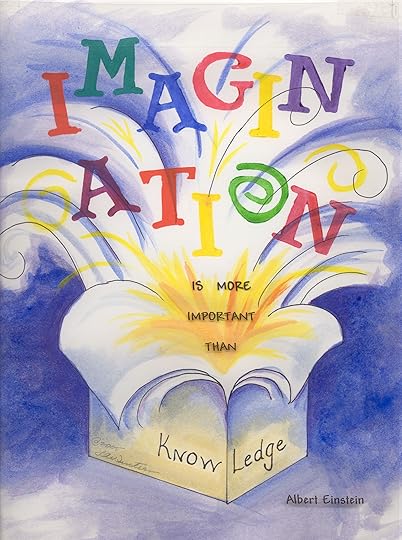
“Only an unfettered mind, where imagination has full play, has the audacity to challenge the impossible.” – Uell S. Anderson
Let kids imagine what they are imagining. Their minds at young ages are naturally “unfettered” so adults should allow them to express their imagination in whatever words they use. This means we should help them formulate their imagination into sentences if they are at a loss for words. Fostering their imagination and helping to grow it will only further necessary critical thinking skills later on and teach them that dreaming big is not a worthless activity.
Entertain their imagination and see the world through their eyes. It’s actually fun to play along and have fun with them. As adults, we don’t have the time to imagine or we’re so jaded that we don’t allow it to happen. We let others think things for us. We let technology do all the work. We are obsessed with news. So instead, let a child’s imagination be your experience, too. Encourage them lovingly that it’s ALL possible.
Here are a list of inventions that would have blown your mind only twenty years before they became REALITY:
Gasoline and automobiles purchased and owned to take us wherever we want to go, whenever we want to go
Electricity for every day and casual use
Computers used for conducting business
Internet dictating our every move, health question, education, and social interaction
Who’s laughing now?
Move over, mamas and papas and make room for your child’s imagination to come into full play. Stand clear for your little one who has the audacity to challenge the impossible could be the next Edison, the next Einstein, the next Bill Gates or Mark Zukerberg!
After all, everything that is real was once imagined!
The post Imagination Running Wild appeared first on Tools of Growth.
September 21, 2015
Deconstructing Parenthood: The Conscious Way with Dr. Shefali
We’d love to invite you to join Roma Khetarpal, the Master of Ceremonies, at this incredible 3-day intensive workshop, Deconstructing Parenthood: The Conscious Way with Dr. Shefali. This event will take place December 4 – 6, 2015 in Long Beach, California at the Renaissance Long Beach Hotel. Registration is now open and spaces are limited.
LEARN HOW TO:
End Conflict at Home
Discipline Consciously
Communicate Effectively
Transform Your Relationship
… WITH YOUR CHILDREN FOREVER!
Special guests include:
Mallika Chopra
Susan Stiffelman
Atomic Moms
Suzi Lula
We look forward to seeing you there and having an unforgettable weekend.
REGISTER
The post Deconstructing Parenthood: The Conscious Way with Dr. Shefali appeared first on Tools of Growth.
September 14, 2015
3 Tools to Advocate Kindness and Accelerate Communication
All parents are driven with the common intention of doing the best that they can for their children. From the minute they awake to the minute they fall asleep at night, parents’ schedules revolve around their needs and wants. Why? To put it simply, parents love their children like no other. As parents, this unique love inspires us to function beyond our expected intellectual, emotional, and physical capacity. And yet, we do it all willingly and tirelessly. Well, for the most part.
However, It is only when we are faced with dilemmas that challenge us do we sometimes lose our footing and our sanity. When we find ourselves in such a situation, there is that one tool that can help us to rise above and showcase our love and save the day despite the circumstances.
That savior is KINDNESS.
When parents remind themselves to be kind during the storm, it helps keep guilt at bay for the parents and lets their child know that they are loved no matter what, thrusting them into a defenseless, constructive, learning mode. If a discussion is necessary, parents should coat their message with kindness and if discipline is called for, parents should deliver it with kindness. too.
Kindness is simply an attitude and a tone of voice that echoes the love that we feel for our children. Kindness truly is the home where love lives.
By being kind, we are actually acting out what Daniel Goleman, award winning author, psychologist, science journalist, and the Father of Emotional Intelligence calls “compassionate empathy,” which research proves can immediately improve your life while improving your childs’.
Here are some 3 quick TOGs (Tools of Growth) that advocate kindness and accelerate communication:
1. Use terms of Endearment : Opt for “What’s the matter, love?” (which will immediately open up their minds and their hearts) instead of terms of enfearment like “Whats wrong with you?”
2. Back that up with a calm and kind tone of voice, which will help keep the child’s defenses down.
3. The power of touch during challenges has limitless potential. A gentle stroke, a kind rub on the back while using a calm tone of voice and terms of endearment can help pacify the child and take the edge off, encouraging communication and helping you to speed up to a resolution.
The post 3 Tools to Advocate Kindness and Accelerate Communication appeared first on Tools of Growth.
September 9, 2015
Envoi–Dr. Wayne Dyer
Last Sunday, the world bid farewell to one of its most profound personal growth teachers—Dr. Wayne Dyer. Endearingly referred to by many as the father of motivation, he not only lived his own life purposefully but also led many of us to do the same. I am one such fortunate recipient of his teachings and his wisdom.
In 2001 I went through a health challenge for almost two years. With two young children and my husband by my side, I left no stone unturned to search for the cause. I was desperate to get a diagnosis for my myriad neurological symptoms and had become a frequent visitor to diagnostic centers at UCLA, USC, and Cedars-Sinai. After being hospitalized a couple of times for episodes and flare-ups, I even traveled to Germany to seek alternate treatment.
Then In March 2003, Dr. Jim Pickerel, N.D., whom I was working with, became really concerned with my declining physical and mental health. Aware that I had exhausted all allopathic and naturopathic options, he gave me a CD set that would forever change my life: How to Get What You Really, Really, Really, Really Want by Dr. Wayne Dyer and Deepak Chopra, M.D. Since I had nothing to lose, I decided to give the steps that they advocated a sincere try, and within a few short weeks, I was astounded at the progress I started to make. Needless to say, I became not just a fan but also a lifelong student of Dr. Dyer and his work.
Besides reading all of his books and following him online, I had the pleasure of seeing this dynamic speaker, author, and teacher in person at least 50 times—often accompanied by my children and husband, making Dr. Dyer a popular influence and household name in my family!
“Doing what you love is the cornerstone of having abundance in your life,” said Dr. Dyer. These words became my pillars as I followed my passion with my book, The “Perfect” Parent, for which Dr. Dyer was the primary inspiration.
Last January, despite all kinds of pressing obligations, I couldn’t pass up the opportunity to spend a weekend with Dr. Dyer in Maui at his “Divine Love” event. It was amazing to see the ease with which he walked 500 people through his teachings with such simplicity, humor, and love!
When I reflect on the great influence Dr. Dyer has had on my life, I cannot help but be humbled by the fact that mine is just one of thousands of lives he touched with his teachings.
Wayne, please know that the echo of your powerful voice and the gift of your wisdom will live to touch generations to come. You said in your book Change Your Thoughts, Change Your Life, “When you see the world as full of opportunities to help, one thought and one action at a time, you’ll be living by your inner light.” Having shown us the way by example, you have inspired us to live with our own inner light. Thank you for sharing yourself so selflessly and leaving behind a legacy to celebrate. Farewell, dear friend. Until I see you again…
Infinite Love and Gratitude.
The post Envoi–Dr. Wayne Dyer appeared first on Tools of Growth.
August 31, 2015
Letting Go: Guide and Step Aside
When my kids were halfway through their junior year of high school, we started to notice their struggle for independence. As talks of college applications became more frequent, the idea of leaving home and taking care of themselves understandably grew more real to them. They both pushed for easier curfews and for the freedom to make more of their own decisions. Even though they had started driving and were beginning to break out of our constant supervision and direction, it was tough for my husband and me to let go.
Sometimes I would say, “I think it’s too soon to let her go completely. After all, she is only seventeen. She has just started driving.”
My husband would reply, “You have to start now. It’s good preparation for going off to college.”
At other times, especially after one of them had made a mistake, my husband would say, “Maybe he is not ready to manage his own life completely yet. Let’s give him independence in small chunks and see how he does.”
“We have to start letting go now,” I would respond, “so he can fall and learn while he is still at home and we are around to help him get back up.”
There is no one correct answer. Giving our children their independence and letting go of them step by step has to be based on each child’s personality. While they’re under our wing, we must give our children more room to be independent. This is the only way we can be reassured that they will be able to take care of themselves when they do leave home.
Letting go of our children is one of the biggest challenges that parents face. It is particularly difficult when we experience, firsthand, the transition of our teenage children into young adults. The only way we can show them our unconditional love at this age is by keeping the doors of communication wide open and reminding ourselves to guide and step aside. Even though this can be the most trying part of raising children, it’s the only way to prepare them to thrive on their own. Yes, they will stall and fall, but this will also teach them to stand tall. Stay at arm’s length, watch them closely, and stay out of their way – not to let go completely but to step aside and watch from the sidelines. Stepping into young adulthood is a process of self-discovery for them. If our kids want to be the captains of their own ships, we have to be prepared to be the co-captains and be there to help them navigate through the big waves.
When they do fall, curb yourself from saying anything resembling I told you so or from calling them “irresponsible.” Instead, put your unconditional love into words by saying, “That’s okay. This is how you will learn to take care of yourself and become more responsible. I know this hurts,” you might say. “I’ve been there. But this is how you will learn. I know you can do this.”
Encourage them to learn from their mistakes. Help them get back on their feet, and then hand over the steering wheel again. Guide and step aside is a parenting model that every parent should practice. It is the ultimate expression of letting go and of unconditional love – one that nurtures their resilience and self-reliance and anchors their inner perfection.
Read more in The “Perfect” Parent.
The post Letting Go: Guide and Step Aside appeared first on Tools of Growth.
August 24, 2015
The “Perfect” Parent Wins Mom’s Choice Gold Award®
We were so honored and grateful to receive the news that The “Perfect” Parent won the Mom’s Choice Gold Award®. After a rigorous evaluation process by an MCA judging panel, the book was deemed among the best in family-friendly media, products and services.
“Our aim is to introduce families and educators to best-in-class products and services,” explains Dawn Matheson, Executive Director of the Mom’s Choice Awards. “We have a passion to help families grow emotionally, physically and spiritually.
This award is the third bestowed on The “Perfect” Parent, along with the NAPPA Award and the Parents’ Choice Award. We know that parents and educators have a large selection of books to choose from and the process these organizations go through to ensure objectivity and honest evaluation free from manufacturer influence means that products and services bearing the Mom’s Choice seal of approval are high-quality and also a great value. The MCA evaluation program incorporates the expertise of scientists, physicians and other specialists; but also engages parents, children, educators, and caregivers because they are experts in knowing what is best for their families.
While awards are an outward expression of how well the book is doing, the more important recognition is when we hear from parents that the tools of growth we have shared have made a real difference in their parenting, their communication, and ultimately in their relationships with their children. It only takes one family member embracing mindfulness to create a trickle down effect for the entire family. If we can be a part of that, we’ve been successful.
We’d love to hear your stories of how The “Perfect” Parent has made an impact.
__________
About the Mom’s Choice Awards®
The Mom’s Choice Awards® (MCA) evaluates products and services created for children and families. Products and services bearing the company’s mother-and-child Honoring Excellence Seal of Approval have earned the MCA distinction for helping families grow emotionally, physically and spiritually; being morally sound and promote good will; and are inspirational and uplifting.
The MCA program is globally recognized for establishing the benchmark of excellence in family-friendly media, products and services. The organization is based in the United States and has reviewed thousands of entries from more than 40 countries.
In addition to being a best-in-class company for the awards industry, the Mom’s Choice Awards provides collaborative lifetime marketing and promotional support to its Honorees. The company has invested heavily in creating educational, marketing and event opportunities to help Honorees and Distinguished Alumni reach their key markets effectively.
Around the world, parents, educators, retailers and members of the media look for the MCA mother-and-child Honoring Excellence Seal of Approval when selecting quality products and services for children and families.
Learn more about the Mom’s Choice Awards by visiting their website: www.MomsChoiceAwards.com.
The post The “Perfect” Parent Wins Mom’s Choice Gold Award® appeared first on Tools of Growth.
August 17, 2015
TOG and Local School District (SUSD) Bring the Importance of Playtime Center Stage
Last Monday I had the honor of hosting the first of a series of campus supervisor’s (yard duties) training program for Saugus Union School District. This grassroots Mindful Play Leader’s, Lead to Succeed, program was the brainchild of Dr. Joan Lucid, Superintendent of Saugus Union School District (SUSD). Based on her request, extracting tools from my award winning book, The “Perfect” Parent, I customized the tools of growth to educate and empower the campus supervisors of SUSD.
Campus supervisors were thrilled that through this program the school district was “FINALLY” providing them an opportunity to grow and better their skills. With 70 attendees, split in two three and half hour sessions, our first session was a huge success!
As I reflect back on our class, I must admit that I am in awe of the enthusiasm that ran through every minute of the three and half hour session! These play-ground experts, who take both their roles as campus supervisors and their love for children very seriously, worked individually and as groups to bring to the table real life scenarios that we resolved collaboratively using the emotional intelligence and communication tools that were presented in this session.
But truly what brought my heart the most satisfaction was the expressions on their faces when I cited the science behind the importance of their role. As one veteran campus supervisor shared openly, “We know that we contribute to the success of children in our hearts but to actually know that there is science supporting our work is so refreshing and reassuring. I’m done with thinking I’m “just a yard duty”!
I am delighted, humbled and grateful for the confidence and trust that SUSD has invested in Tools Of Growth. And needless to say, I am super excited to see the progress we will make in minimizing the number of concerns on the play ground. I know the district will be watching the reports closely, and tracking the reduction in number of complaints from the play yard as well as the students comfort level in bringing their issues to the campus supervisors. But to me, the defining element of the success of this program will be the connections that will be strengthened between campus supervisors and children—harnessing my larger purpose of contributing to Raise kids to be happy, think positive and do good.
You can find more information on tailoring this program for your school or district here.
The post TOG and Local School District (SUSD) Bring the Importance of Playtime Center Stage appeared first on Tools of Growth.


